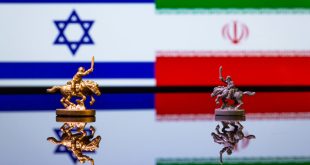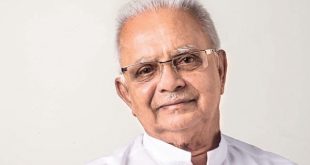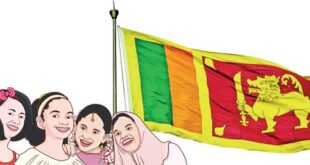PRINCE OF PALESTINE WAS DULY ELECTED BY THE PALESTINIANS, PERHAPS IN A BEST ELECTION EVER HELD IN ARAB WORLD. THERE WAS NO VIOLENCE, RIGGING, AND ABSOLUTE TRANSPARENCY. THE END RESULT THEY WERE DECLARED ” TERRORISTS”. NOW WE KNOW ANY DEMOCRACY TO SUCCEED IN THE ARAB WORLD IT HAS TO BE MADE IN USISRAEL.
George Mitchell is facing a daunting task, as challenging and difficult as a half-hearted mouse hunt in a backyard. He has been tasked with finding a peaceful solution to the West Asia crisis — a crisis many peacemakers have failed to solve since the problem erupted in all its fury and venom in 1947 with the creation of Israel.
But Mitchell is no stranger to the mouse. Neither is he a stranger to peacemaking. He once headed Walt Disney, which has Mickey Mouse as its mascot. Mitchell, the man credited with bringing about peace in Northern Ireland, was touring West Asia last week, meeting Arab, Turkish and Israeli leaders.
The visit came against the backdrop of remarks made by President Barack Obama that West Asia was one of his top priorities. Much hope is being generated in the Arab and Muslim world, with the election of Barack Hussein Obama as the United States’ 44th president. During his campaign, he vowed to usher in change and, now in office, he is seen to be doing it. As president, the first call he made to a foreign leader was to Mahmoud Abbas, president of the Palestinian Authority. One of his first executive orders was to close down the Guantanamo Bay prison which held hundreds of Muslims as terror suspects under inhuman conditions. His first one-on-one TV interview as president was with al-Arabiya satellite channel, owned by a Saudi millionaire.
These signals from the new White House are encouraging, notwithstanding Obama’s shocking silence during the Gaza massacre just days before he assumed the mantle of leadership and his pro-Israeli statements during his election campaign. During a visit to Israel in the thick of the election campaign he made an outrageous remark, justifying Israel’s disproportionate attacks on the Palestinians. He said, “If missiles were falling where my two daughters sleep, I would do everything in order to stop that.”
This statement made many analysts to opine that Obama would be just another US President who would bow to any extent to carry out what Israel commanded. Obama saw the plight of Israeli children but failed to see or comment on the fear and the horror, with which Palestinian children had been living. Palestinian children are more likely to be killed by Israeli bombs and missiles than by natural causes before they attain puberty.
If this statement of his was bad enough, the appointment of Rahm Emmanuel, an ardent Zionist, as his chief of staff, dimmed hopes for a fair and just solution to the Palestinian crisis. When Israel invaded Lebanon in 2006, Emmanuel rushed to Israel and worked for the Zionist state’s military, attending to the repairs of military vehicles deployed in the massacre of civilians in Lebanon.
If Emmanuel’s appointment was seen as peace-breaking and hope-dashing, Mitchell’s appointment as the United States envoy for West Asia is seen as hope-stirring.
Mitchell is a peacemaker with a proven record of success in Northern Ireland. His commitment, patience, dedication, constant diplomacy, strategy and focus all contributed to the 1998 Good Friday Agreement which led to Northern Ireland’s Protestants and Catholics to sit side-by-side in a power-sharing administration.
His visit to West Asia came hours after Obama’s interview with al-Arabiya. The interview was probably well choreographed to coincide with the Mitchell visit and also win him many converts in the Arab and Muslim world, where the streets are full of anti-American sentiments largely due to the United States’ blind support for Israel, even when the Jewish state is seen as the wrongdoer.
In the al-Arabiya interview on Tuesday, the Arab Muslim world heard Obama saying that America was not the enemy of the Muslims.
“My job is to communicate the fact that the United States has a stake in the well-being of the Muslim world — that the language we use has to be a language of respect. I have Muslim members of my family. I have lived in Muslim countries…. My job to the Muslim world is to communicate that the Americans are not your enemy. We sometimes make mistakes. We have not been perfect.”
Saying mea culpa is welcome and unheard of in US politics. No other US president has made such a bold statement. It must have caused some ripples in Israel, which has a powerful clout on the US decision-making process, unless, of course, Obama said it with Israel’s consent.
If what Obama said in the interview was encouraging what he did not say was conspicuous and disturbing. He deliberately avoided mentioning the Gaza massacre, which he could not deny seeing on television. Perhaps, he was a silent observer.
The omission probably gives credence to the claim that, in spite of his new approach, with which he is seeking to bring about change in the West Asia policy of the United States, he is tethered to the lopsided US policy where the national interests of Israel and the United States are bound together.
The omission is probably also an indication that whatever solution Mitchell recommends will not come at the cost of Israel’s short-term goal of perpetuating the Palestinian suffering and its long-term goal of annexing more Palestinian land.
This explains why the Arab and Muslim world is not overtly jubilant over Obama’s new approach, even after the al-Arabiya interview. Shorn of any power to fight Israel or influence US policy, the Arab world, however, like the proverbial drowning man, will grab even at a straw. The Arabs and the Palestinians have no option but to give Obama also a chance.
His envoy, Mitchell, was touring West Asia, listening to what each side had to say. But sadly what is being enacted is a Hamlet without the prince of Palestine. Yes, there is little room for Hamas, the legitimate government the Palestinian people elected in January 2006.
If the Obama administration has any respect for democracy, it should recognize Hamas and end the punitive sanctions which are crippling life in Gaza. When Hamas was overwhelmingly voted into office, the United States, the European Union and countries that are seen as US lackeys stopped aid to the Palestinian Authority. The financial blockade continued until the Hamas government was illegally dissolved by Palestinian Authority President Mahmoud Abbas, whom the West favours. Hamas now runs a moneyless administration in the Gaza Strip, after a violent fratricidal clash with Abbas’ Fatah. Abbas’ term as Palestinian president ended on January 9 but there is uncertainty over the election, which is likely to be won by Hamas.
If the Obama administration is serious about the peace process, Mitchell should speak to Hamas also, instead of insisting on those hackneyed conditions that call on Hamas to renounce violence, recognize Israel and respect all the agreements the Palestinian Authority has entered into with Israel. The Obama administration has added one more condition — Hamas should reconcile with Fatah. It also backs an Israeli-centred European initiative aimed at preventing Hamas from rearming itself.
The West, which was quick to punish Hamas, does not place any conditions on Israel. For instance, Israel could also be asked to renounce violence, respect Palestinian territorial integrity and recognize the Palestinians’ right to return. The west knows well that it can bully Hamas but not Israel. Past records also show that whatever promises Israel has given are observed only in the breach. If Israel is serious about its promises which it undertook to implement under the 1993 Oslo deal, the Palestinian state would have been several years old today.
Will George Mitchell be an impartial peace maker? Yes, he will, if he adopts the same principles which he adopted to bring peace to Northern Ireland. He was even-handed. He put forward the same set of rules to both the Catholics and the Protestants — that they renounce violence and pledge a commitment to peaceful means of conflict resolution.
One more significant factor in the Northern Ireland peace process was that Mitchell spoke to Northern Ireland’s equivalent of Hamas — the Irish Republican Army, a terrorist organization, according to Britain.
If Mitchell sees a problem in talking to Hamas, one suggestion is that in parallel with his peace moves, elections should be held for the Palestinian presidency and the national assembly. The winner, whether it is Hamas or Fatah, will be in a stronger position to talk to Mitchell and participate in the peace process as the legitimate representative of the Palestinian people.
Mitchell is no stranger to West Asia. In 2000, he chaired an international commission that probed the events that led to the second intifada. If he is serious about his mission, he should also peruse the Arab League proposals which the present Saudi King Abdullah presented in 2002. Despite the criticism the Saudis draw from the Muslim world for being a staunch ally of Israel’s US backers, their proposals were the best formula to emerge since the conflict arose in 1947.
Born of an Irish Catholic father and an Arab mother, Mitchell calls himself an Arab-American. His impressive CV is anybody’s envy. When he started the Northern Ireland peace process, Unionist leader David Trimble and Irish Republican Army leader Gerry Adams even refused to sit at the same table. But within years, the arch foes shook hands and signed the Good Friday Agreement.
 Sri lanka Muslims Web Portal Diversity and Inclusiveness
Sri lanka Muslims Web Portal Diversity and Inclusiveness



